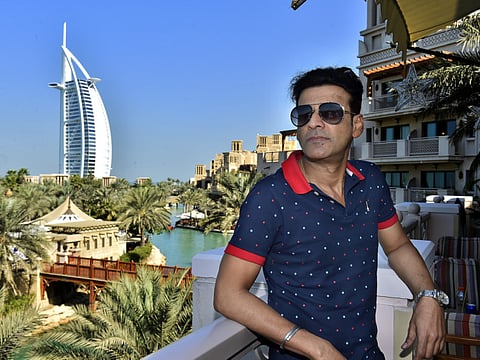Diff 2017: Manoj Bajpayee’s creepy act in ‘Shadows’
The award-winning actor looks inwards to tap into his dark side in the psychological thriller

Indian actor Manoj Bajpayee knew that his role as a troubled recluse in psychological thriller In The Shadows would never win a popularity contest. But that didn’t stop him from exploring his dark side.
A month before he began filming for the thriller, which saw a full house at the Dubai International Film Festival screening on Sunday and Tuesday, Bajpayee cut off all ties from his family and friends for over a month to get into his character. Even during filming, no one was allowed to speak to him so that he remained in that zone.
Set in the dilapidated cross-lanes of Old Delhi, Bajpayee plays the loner and compulsive voyeur Khuddoos, who sets up cameras in his crumbling home to spy on his neighbours. He derives a sense of purpose while invading their privacy and derives a weird sense of purpose while snooping into what happens behind closed doors of his neighbours. A camera that peeks into their bathrooms, bedrooms and kitchen is routine for him.
“But he’s doing it to make himself feel better about his own life and to remind himself that he’s not the only one who’s messed up. Others are messed up too. For him, it’s a comforting experience and a validation of his own miserable existence,” said Bajpayee in an interview with Gulf News tabloid!. The actor takes the example of how he spots his neighbour — the mother of two children (Shahana Goswami) getting cosy with the servant — and his character is awash with feelings of disgust and a weird sense of comfort.
The moral bankruptcy in others gives a boost to his own shattered lonely existence.
“Watching them made him realise that his family is not the only family that is ruined and tattered. At the end of the day, families are going through the same thing,” he said.
Bajpayee, who seems to be an advocate of method acting, also gave up certain foods to acquire an emaciated appearance. But the naturally lanky actor didn’t try out anything extreme like a starvation diet or embarking on a lettuce diet.
“I was 3kg lighter for this film and my bones were showing. But what happens with me is that keeping my check on my diet is the easiest thing. Although I love my meat, I have a great amount of control when it comes to food. The only thing I had to struggle to keep a check was on the intake of white wine. I had to give that up for some time and that wasn’t easy,” said Bajpayee, adding that even if we kept his favourite mutton biryani in front of him, he would look the other way.
But looking the part was the easy bit. How does an actor humanise and make viewers empathise with a proverbial peeping Tom haunted both the actor and its director?
In The Shadows is directed by debutante Dipesh Jain, an Indian filmmaker based in Los Angeles.
“When I was discussing the concept of In The Shadows with my mentors and my writer friends, they said ‘You are writing about a character who is a passive protagonist, who doesn’t speak that much and on top of that you are giving him a negative quality like peeping. It will put them off’,” said Jain. But the voyeurism was also symbolic of the central character’s feeling of isolation and desolateness in his troubled life. The only friend and source of comfort is his friend, played by Ranvir Shorey, who visits him occasionally.
“Installing cameras was the only way that he could find that connect with the outside world that had ostracised him,” said Jain, who had spent many summers in Old Delhi during his childhood.
Bajpayee has a simpler explanation of turning his character palatable. Sometimes a character needs to be looked in totality.
“You can make people sympathise with the rapists or serial killers, if you make a story on them. In those films, they tend to become the hero of their own story. So when you are looking at them, you are looking at all the aspects of their life. You are not looking at just the darker side of it, you are also looking at what makes them do certain things in life,” said Bajpayee. His aim as an actor was to make them understand him as a character.
“You don’t have to necessarily love me, but that understanding of who I play on the big screen is very important.”



